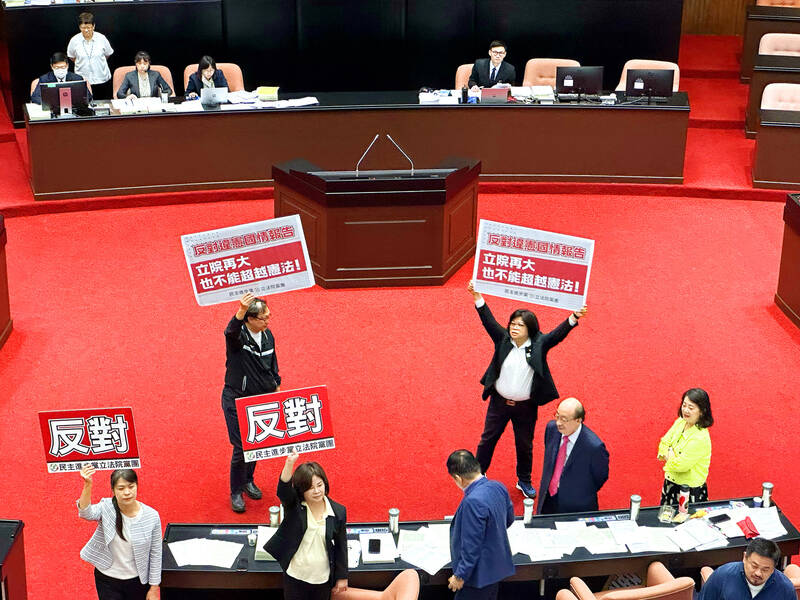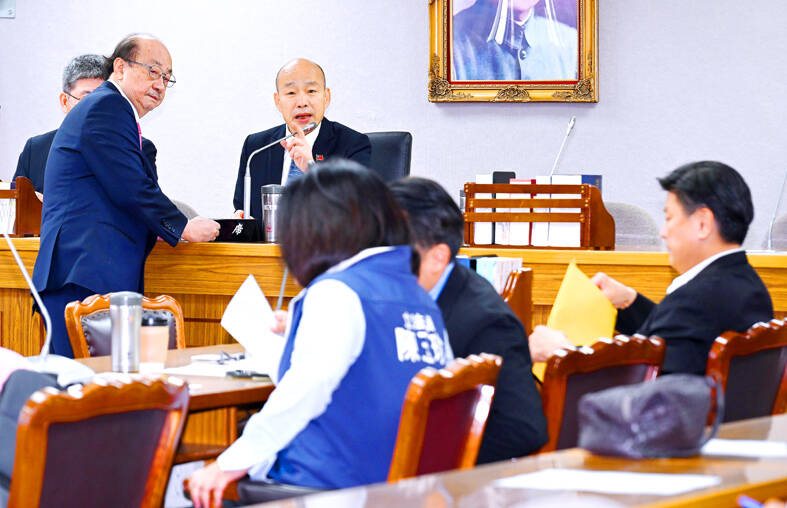Legislators yesterday passed the third reading of amendments to Article 49 of the Electricity Act (電業法), which stipulate that at least half of the electricity price evaluation committee should be made up of civilian representatives, and a resolution to invite President William Lai (賴清德) to present a state of the nation address at the Legislative Yuan.
They also passed a motion proposed by the Taiwan People’s Party (TPP) and Chinese Nationalist Party (KMT) that the government remove restrictions on group tours to China.
On the last day of this year’s first legislative session, the legislators attempted to deal with dozens of bills through negotiations or voting.

Photo: Lin Che-yuan, Taipei Times
The TPP’s version of amendments to Article 49 of the Electricity Act passed the third reading.
The amendments state that civilian representatives, which include experts and civic group members, should make up at least half of the members of an electricity price evaluation committee.
The committee’s evaluation method would be decided by the Ministry of Economic Affairs, based on the principle of fairness, justice and transparency, they say.

Photo: Liao Chen-huei, Taipei Times
The KMT first proposed the amendment, saying that power price hikes must be approved by the legislature.
Legislators also passed the TPP’s and the KMT’s joint proposal to observe the newly amended Act Governing the Legislative Yuan’s Power (立法院職權行使法) and invite the president to present a state of the nation address at the legislature.
The president would be obliged to respond to legislators’ questions, while issues such as how long the questions should be, how many legislators would be allowed to ask questions, the order of priority and the ratio of legislators from different political parties, would be discussed and agreed upon through cross-caucus negotiations.
The TPP’s and the KMT’s proposal demanding that the government remove restrictions on group tours to China, and prioritize Chinese tourists and tour groups wanting to visit Kinmen, Penghu and Lienchiang counties also passed.
The Ministry of Transportation and Communications had previously banned Taiwanese tour groups from visiting China from June 1.
Lawmakers also passed a proposal to ensure that each point under the National Health Insurance (NHI) program’s point system would be equivalent to NT$0.95 or NT$1 by June 30 next year to ensure the program remains solvent.
It was a rare instance in which a measure is to be implemented without amending a law.
Parties agreed during cross-party negotiations not to pass a draft statute for reconstruction after the April 3 earthquake, but to directly approve a resolution to subsidize reconstruction and promote local development.
The magnitude 7.2 earthquake resulted in 17 deaths and 1,146 injuries, and more than 1,247 buildings nationwide were listed as “dangerous.” It also caused nearly NT$100 billion (US$3.07 billion) in damage to agricultural produce.
Amendments to Article 286 of the Criminal Code unanimously passed a third reading.
The amendments increase the punishment by half of the original sentence for people found guilty of abusing children under the age of seven or those who are physically or mentally challenged.
Amendments to the National Communications Commission Organization Act (國家通訊傳播委員會組織法) also passed, restricting all commission members to a maximum of two terms and removing all clauses regarding extensions or reappointments.
The amendments also state that if the committee cannot find seven members as mandated, the premier is obligated to nominate people to fill the positions within three months.

AGING: As of last month, people aged 65 or older accounted for 20.06 percent of the total population and the number of couples who got married fell by 18,685 from 2024 Taiwan has surpassed South Korea as the country least willing to have children, with an annual crude birthrate of 4.62 per 1,000 people, Ministry of the Interior data showed yesterday. The nation was previously ranked the second-lowest country in terms of total fertility rate, or the average number of children a woman has in her lifetime. However, South Korea’s fertility rate began to recover from 2023, with total fertility rate rising from 0.72 and estimated to reach 0.82 to 0.85 by last year, and the crude birthrate projected at 6.7 per 1,000 people. Japan’s crude birthrate was projected to fall below six,

Conflict with Taiwan could leave China with “massive economic disruption, catastrophic military losses, significant social unrest, and devastating sanctions,” a US think tank said in a report released on Monday. The German Marshall Fund released a report titled If China Attacks Taiwan: The Consequences for China of “Minor Conflict” and “Major War” Scenarios. The report details the “massive” economic, military, social and international costs to China in the event of a minor conflict or major war with Taiwan, estimating that the Chinese People’s Liberation Army (PLA) could sustain losses of more than half of its active-duty ground forces, including 100,000 troops. Understanding Chinese

US President Donald Trump in an interview with the New York Times published on Thursday said that “it’s up to” Chinese President Xi Jinping (習近平) what China does on Taiwan, but that he would be “very unhappy” with a change in the “status quo.” “He [Xi] considers it to be a part of China, and that’s up to him what he’s going to be doing, but I’ve expressed to him that I would be very unhappy if he did that, and I don’t think he’ll do that. I hope he doesn’t do that,” Trump said. Trump made the comments in the context

SELF-DEFENSE: Tokyo has accelerated its spending goal and its defense minister said the nation needs to discuss whether it should develop nuclear-powered submarines China is ramping up objections to what it sees as Japan’s desire to acquire nuclear weapons, despite Tokyo’s longstanding renunciation of such arms, deepening another fissure in the two neighbors’ increasingly tense ties. In what appears to be a concerted effort, China’s foreign and defense ministries issued statements on Thursday condemning alleged remilitarism efforts by Tokyo. The remarks came as two of the country’s top think tanks jointly issued a 29-page report framing actions by “right-wing forces” in Japan as posing a “serious threat” to world peace. While that report did not define “right-wing forces,” the Chinese Ministry of Foreign Affairs was